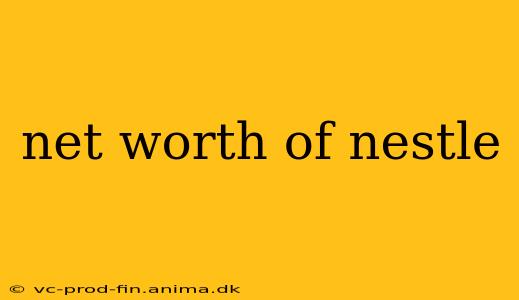Nestlé, a multinational food and beverage conglomerate, is a global powerhouse. Understanding its net worth requires looking beyond a simple number and delving into the complexities of its financial structure and market valuation. This in-depth analysis will explore Nestlé's financial health, providing a comprehensive picture of its worth and answering frequently asked questions.
What is Nestlé's current net worth?
Pinpointing an exact "net worth" for Nestlé is challenging. Unlike privately held companies, publicly traded companies like Nestlé don't have a single, readily available net worth figure. Instead, we rely on its market capitalization, which represents the total value of all its outstanding shares traded on the stock market. This figure fluctuates constantly based on share price movements. To find the most up-to-date market capitalization, you should check reputable financial news sources or Nestlé's investor relations website. Remember, market capitalization is not the same as net worth, which is total assets minus total liabilities.
How is Nestlé's net worth calculated?
Nestlé's market capitalization is calculated by multiplying the current share price by the total number of outstanding shares. This provides a snapshot of what the market believes the company is worth at a given moment. To calculate a closer approximation to net worth (though still an estimate), one would need to analyze Nestlé's financial statements (typically found in their annual reports) to determine their total assets and total liabilities. Subtracting liabilities from assets would give a closer, albeit still imperfect, figure to Nestlé's net worth. However, the market capitalization is the most widely used and readily accessible metric to understand the overall value the market assigns to Nestlé.
What are Nestlé's main assets?
Nestlé's substantial assets are diverse and extensive, spanning a global network. They include:
- Brands: A vast portfolio of iconic global brands like KitKat, Nescafé, Nespresso, and Gerber, representing significant brand equity and market dominance.
- Manufacturing facilities: A worldwide network of production plants and distribution centers.
- Intellectual property: Patents, trademarks, and other intellectual property rights.
- Investments: Holdings in other companies and ventures.
- Real estate: Ownership of various properties including offices, factories, and land.
What factors influence Nestlé's net worth?
Several factors dynamically impact Nestlé's market capitalization and perceived net worth:
- Stock market performance: Overall market trends significantly influence the price of Nestlé's shares.
- Financial performance: Profitability, revenue growth, and efficiency directly impact investor confidence and share price.
- Global economic conditions: Economic downturns or regional instability can affect sales and profitability.
- Consumer trends and preferences: Changes in consumer behavior and demand for specific products.
- Competition: The competitive landscape and actions of rival companies.
- Regulatory environment: Changes in food safety regulations or other government policies.
- Currency fluctuations: As a global company, Nestlé's valuation is affected by exchange rate changes.
How does Nestlé's net worth compare to other food companies?
Nestlé consistently ranks among the largest food and beverage companies globally, typically having a market capitalization exceeding most of its competitors. Precise comparisons would require a real-time analysis of the market capitalizations of other leading companies in the sector. However, Nestlé's size and diverse portfolio generally position it as a market leader in terms of overall valuation.
This detailed analysis provides a more nuanced understanding of Nestlé's financial standing than a simple net worth figure could offer. Remember that market values fluctuate constantly, so always refer to up-to-date financial sources for the most current information.
